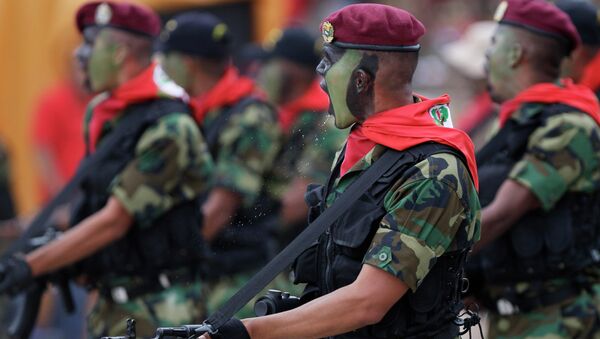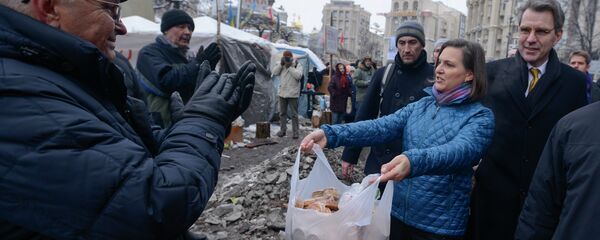The Russian Foreign Ministry has warned of an increasing number of signs that a military coup in Venezuela is becoming the "West's priority".
READ MORE: Maduro Slams Trump-Duque Meeting as 'Feast of Hatred Toward Venezuela'
The ministry's spokeswoman Maria Zakharova said on Thursday that the United States has chosen a highly confrontational scenario in Venezuela and is openly encouraging Venezuela's armed forces to mutiny.
"In general, all suggests that the White House has chosen a scenario of acute confrontation with the use of force in Venezuela. I believe that [Washington] even does not try to hide that. All means of information and psychological pressure are being used: from manipulation and provocative media speculations to direct blackmailing and incitement to hatred. The main target is the armed forces of the Bolivarian Republic", she said.
"Venezuelan servicemen are openly being incited to a rebellion. High-ranking officials in Washington are calling on the armed forces of a sovereign state to side with new political leadership. What right does the United States have to talk about democracy and legal framework both within a separate state and on the global stage after that?" Zakharova added.
Lavrov Warned Pompeo Against Any Military Meddling in Venezuela
In a phone conversation with his American counterpart Mike Pompeo, Russian Foreign Minister Sergei Lavrov has warned Washington against any military interference in Venezuela, Zakharova said.
"I would like to remind you that the day before yesterday, on the initiative of the American side, there was a telephone conversation between Foreign Minister Sergei Lavrov and the US Secretary of State, Mr Pompeo, during which the Russian minister warned against any external interference in the internal affairs of Venezuela".
The ministry spokeswoman elaborated that Russia was sticking to norms of international law and sovereignty in accordance with the UN Charter, and was ready for a dialogue based on those principles, including with the United States.
Provocations from Colombia Under Guise of Humanitarian Convoy
According to her, a provocation was being prepared from Colombia's Cucuta under the guise of a humanitarian convoy to Venezuela, and emphasised that it could nor rule out casualties.
“Let us not be deceived, or deceive others — a provocation, including with casualties, is being prepared under the guise of a humanitarian convoy. And it is needed as a pretext for a forceful action from outside. And everyone should clearly understand this. We consider it urgently necessary to refrain from steps and statements that could provoke an escalation of tension in Venezuela, in particular, any appeals to the Venezuelan armed forces fraught with their involvement in an internal civil confrontation", she said.
The comment came after US President Donald Trump and his Colombian counterpart Ivan Duque agreed to provide "humanitarian aid" to Venezuela, which is strongly opposed by Nicolas Maduro.
Reported US Contacts With Venezuelan Army
Last week, Reuters cited a senior White House official as saying that the Trump administration expected more servicemen to pledge allegiance to Juan Guaido, Venezuela's self-proclaimed interim president:
"We believe these to be those first couple pebbles before we start really seeing bigger rocks rolling down the hill. We're still having conversations with members of the former Maduro regime, with military members, although those conversations are very, very limited", the official, who spoke on condition of anonymity, said.
The report came shortly after US National Security Adviser John Bolton tweeted that Washington might consider lifting sanction on senior Venezuelan military officers if they abandon incumbent President Nicolas Maduro:
The U.S. will consider sanctions off-ramps for any Venezuelan senior military officer that stands for democracy and recognizes the constitutional government of President Juan Guaido. If not, the international financial circle will be closed off completely. Make the right choice!
— John Bolton (@AmbJohnBolton) 6 February 2019
Venezuela has been embroiled in an ongoing political crisis since Guaido declared himself the country's interim president, thus challenging the legitimately elected Maduro. The move was swiftly recognised by the United States, which has also been encouraging the international community to follow suit.
In a bid to force Maduro out of office, the Trump administration imposed sweeping sanctions on state-run oil giant PDVSA and blocked his government's assets, having passed control over certain frozen assets to Guaido instead. Washington has also said that a military intervention in Venezuela was "an option".
While Maduro slammed the restrictions as illegal, the Venezuelan Supreme Court hit back by blocking Guaido's bank accounts and financial transactions within the country's jurisdiction, and imposed a travel ban on him until a probe into his activities is completed.
READ MORE: Venezuela to Increase Oil, Gold Production in 2019 Amid Domestic Crisis — Maduro
The United States, Canada, Israel, a handful of European countries and a number of South American nations have recognised Guaido as Venezuela's interim president, while Russia, Cuba, China, Iran, Turkey and several other nations have backed Maduro as the legitimately elected head of state.




